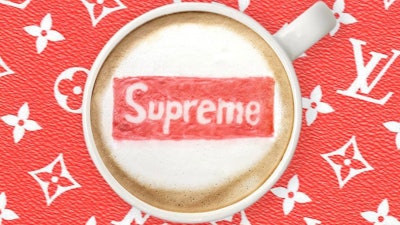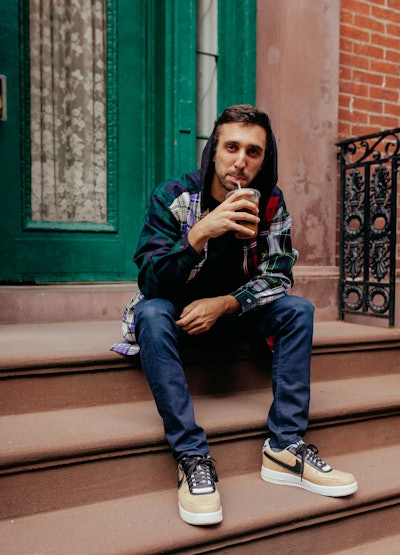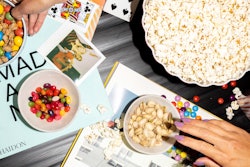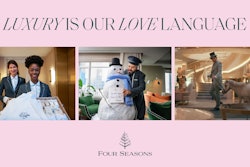
 Ryan Glick, founder and president of Coffee 'n Clothes (CNC).Photo: Courtesy of Coffee 'n Clothes
Ryan Glick, founder and president of Coffee 'n Clothes (CNC).Photo: Courtesy of Coffee 'n Clothes
But for Glick, Coffee ‘n Clothes wasn’t always about event planning, venue sourcing, overseeing production, or activating. It was about a young creative living in New York City snapping photos of, well, coffee and clothes.
To find out how the brand has evolved since its serendipitous launch into the events world in 2019, BizBash sat down with Glick, who dished all the details.
Take us all the way back to the beginning—how did Coffee ‘n Clothes start?
I was always doing my own thing, even back before Instagram—I had my own blog, then I launched a Twitter account for it, then an eCommerce site. It was all fashion. And I was doing some freelance for other fashion brands as well. I moved to New York with literally no job. I was doing my website and my freelance stuff, and I got a job at a social media agency, which was later acquired by Havas. It grew pretty fast, so I was doing social media—managing the content, coming up with strategies, and doing photo shoots on-site for anyone from Bloomingdale’s and Adidas to Bacardi.
Since my life was literally social media, for fun, I started Coffee ‘n Clothes (CNC). On the weekend, I would go to different coffee shops to learn the city because I was new. Then I started taking photos of my coffee and my clothes and after two weeks of that, I thought: “Wait a minute, let me make this a hashtag. Let me make this account.” This was back in 2013. I remember walking to the Apple Store—I had a Genius Bar appointment—and on the way, I was like “clothes and coffee, this is great,” but the account was taken. So I was like, “coffee and clothes, this is better.” I literally made the account on my walk there.
So CNC started as an Instagram account (@coffeenclothes / @designerlattes) with a hashtag (#coffeenclothes), and people literally posted photos of their coffee and their clothes—a top-down perspective. In 2019, CNC opened a storefront in New York City's Soho neighborhood. Here, coffee cups and sleeves were branded, and CNC even created its own blend of coffee.Photo: Courtesy of Coffee 'n Clothes
In 2019, CNC opened a storefront in New York City's Soho neighborhood. Here, coffee cups and sleeves were branded, and CNC even created its own blend of coffee.Photo: Courtesy of Coffee 'n Clothes
How did the Instagram account evolve into an experiential agency?
It was stepping stones—my first blog was the incubator, essentially, for CNC. It was 2014—Instagram had no algorithm and it was different. Then all of a sudden, the hashtag and social behavior started to get press in Refinery29, Harper's Bazaar, and GQ, for example, and the stories were all about this new trend of coffee being the hottest fashion accessory.
And it transitioned—first we were trying to be a media company, or evolve our Instagram account into a media company. That was just not a fit, so we started to serve coffee in retail stores. That’s where the term “designer lattes” came from. But I had no background in coffee, although I obviously like coffee. It was literally just combining coffee and clothes. It made sense for us to do it.
But it all started after we got the momentum from the press. We started getting tapped for sponsored posts on Instagram—our first one was with Asus, the tech brand. It was purely digital. Then, two years later, I was thinking, “How do we evolve and transition?” That’s where events came into play. CNC garnered a lot of attention after receiving press in GQ, Refinery 29, WWD, Harper's Bazaar, and more.Photo: Courtesy of Coffee 'n Clothes
CNC garnered a lot of attention after receiving press in GQ, Refinery 29, WWD, Harper's Bazaar, and more.Photo: Courtesy of Coffee 'n Clothes
Nike reached out to us, and the first event we ever did was literally for two Nike stores in the city—Nike in Midtown, which is no longer there, and Nike Soho. We had never done an event before, and we were tasked to do two of them at the same time. That was the first foray into the event [industry].
We then did an event with Diageo and Baileys, the coffee liqueur. But for the first two years, we were only doing coffee events.
Then in 2019, we opened up a cafe in New York. It was in Soho, and that’s when I really got to learn that this is how we do coffee events and the equipment we needed. We started to do events in our space. Brands would pop up in our space. We would brand the coffee sleeves with CNC, for example, but it would be a New York coffee shop's coffee. But then, as it got later on, we started making our own coffee. That’s when we collaborated with Urban Outfitters for a blended coffee. Some of our holiday gifts were our own blend of coffee, and we still did events at other locations. Then COVID hit.  "Nike reached out to us, and the first event we ever did was literally for two Nike stores in the city—Nike in Midtown, which is no longer there, and Nike Soho," Glick told BizBash. "We had never done an event before, and we were tasked to do two of them at the same time. That was the first foray into the event [industry]."Photo: Courtesy of Coffee 'n Clothes
"Nike reached out to us, and the first event we ever did was literally for two Nike stores in the city—Nike in Midtown, which is no longer there, and Nike Soho," Glick told BizBash. "We had never done an event before, and we were tasked to do two of them at the same time. That was the first foray into the event [industry]."Photo: Courtesy of Coffee 'n Clothes
At what point did you quit your other job to do CNC full time?
It was very slow because, you have to remember, I didn’t start this as a company. I wasn’t an entrepreneur, and I wasn’t into business. I was literally just 23, working hard on my job and, on the side, started this Instagram account. It got to the point where working at my full-time job was a hindrance to CNC. I had to step out of the office to take calls, and I was making more money at the side thing than I was at my full-time job. So I just took a risk—I believed in what I was doing and in the worst-case scenario, I could get a job again.
So for the first two years of doing CNC, I was one foot in, one foot out. I was still doing other stuff—freelancing—because I needed to make money to live. I wasn’t fully committed. But when I shut down everything else in my life to fully focus on CNC, that’s when it really started to grow. I got an office, hired our first person for content, and I was focused on CNC as a brand.
I was confident because I was really in the coffee scene. I knew all the cafes in New York; I knew all the owners. I started a cafe, so I would talk to all of them. I had pretty good relationships with every cafe. So I was like, “Hey, somebody wants to do catering with me. Bring the staff, bring the equipment, I’ll do the marketing, I’ll make the branded material, and let’s go.” During COVID, CNC debuted a mail kit offering and, at the start of 2021, Glick began focusing solely on events.Photo: Courtesy of Coffee 'n Clothes
During COVID, CNC debuted a mail kit offering and, at the start of 2021, Glick began focusing solely on events.Photo: Courtesy of Coffee 'n Clothes
CNC as an experiential agency was so young when COVID hit. How did the pandemic impact business?
Come February 2020, CNC was still just coffee. That’s when everything shut down. I closed the cafe, I moved to LA, and I basically had to start from zero. That’s when—for six months—I had to figure out, “What are we doing?” That’s when we started to get into mobile trucks and started doing coffee events that weren’t tied to retail brick-and-mortars. We got outside, were COVID safe, and went to where people were—outside. We also started to do mailer kits and at-home packaging.
At the start of 2021, I was thinking, “I need to focus fully on building out an agency.” And I just went down that route. CNC stopped selling products—stopped selling coffee—and I just built out an event company and did events.
We obviously have a lot of brands we already worked with, so I could say, “let’s just start to do events.” That’s when we started to grow our capabilities and went totally away from coffee to be more zoned in on building out an experiential event company, which still had our brand behind it.
Then we brought on a director of production and started to revamp our capabilities. At the start of 2021 it shifted to doing all types of events and pop-ups and digital programs that weren’t necessarily tied to coffee. Now, there’s 15 of us across production, account, creative, and business development.
Do you still use social media as an important tool in growing CNC?
It’s funny—I’m anti-social media now. I’m on my computer and phone enough for work—dealing with emails and running a company—that if I open my phone and start scrolling Instagram for even a second, it’s not a good use of my time.
But I obviously also understand the power of social media because CNC was built on the back of it. Personally, it’s just evolved so much and I’m not as into it anymore, but everyone’s different. Now, if I’m not working, I don’t want to be scrolling. I want to be outdoors, off the screen. I want to be playing golf. I’m having a baby soon, and I want to be present.
And with social media, part of it is luck. I got in at a good time. It was also so, so, so organic. I wasn’t forcing it and I literally wasn’t trying to start anything. It was for fun. It was just people in New York City posting photos of their coffee and their outfits. And it just caught on. For the first two years after CNC broke into the events industry, it only did coffee events. Take this mobile coffee cart, for example, which the experiential agency created to drive awareness to Bumble Hive—the dating app's interactive space—for 2020 New York Fashion Week.Photo: Courtesy of Coffee 'n Clothes
For the first two years after CNC broke into the events industry, it only did coffee events. Take this mobile coffee cart, for example, which the experiential agency created to drive awareness to Bumble Hive—the dating app's interactive space—for 2020 New York Fashion Week.Photo: Courtesy of Coffee 'n Clothes
What advice would you give an event planner looking to make the jump to start their own business?
It’s funny because I get asked this a lot, and I always say to wait as long as you can. I remember wanting to leave my job two years before I left, then a year, then six months. If I were to jump iat my first instinct, it would’ve been too early. You’ll know when you’re ready. Just because you think you’re ready doesn’t mean it’s the time. I think, stay at your job where you can learn and get paid—and if you make a mistake, it’s not the end of the world. I would soak up and learn, and when you’re ready, you’ll know.
It’s not about just starting your own thing. People think it’s more freedom, but it’s tough. Yes, for me, I got freedom in my calendar in that I can do what I want, but I’m always working. I’m probably working more than if I were working at another company. But doing your own thing is tough, and you have to be ready for anything to happen at any moment, and be prepared to solve things in real time. In June, CNC turned a private Los Angeles residence into an IRL Barbie Dream House to celebrate the launch of Forever21’s Barbie Summer 2022 Collection. See more: Come on Barbie, Let’s Go Party: How This Experiential Agency Created a Barbie Dream House for Forever21Photo: Courtesy of Coffee 'n Clothes
In June, CNC turned a private Los Angeles residence into an IRL Barbie Dream House to celebrate the launch of Forever21’s Barbie Summer 2022 Collection. See more: Come on Barbie, Let’s Go Party: How This Experiential Agency Created a Barbie Dream House for Forever21Photo: Courtesy of Coffee 'n Clothes
Where do you hope to see CNC in the next few years?
That’s the million-dollar question. I don’t know, to be honest, because we’re so—as you can see—small and nimble, and we move so fast. If you asked me in 2020 if we would be here I would say no, we want to open up cafes and be a coffee shop. So I don’t know. Again, we’re sticking to that same model that it’s going to happen organically, and whatever happens, we’ll adjust.
But I do think that as we’re starting to become a more solidified agency, if you will, I think we’ll start to do larger-scale events with bigger programs. We’ll grow our team. And then on the brand side, I hope to get back to building our brand and to opening up retail locations and creating more products. That really excites me.
What makes experiential different for us is that we didn’t start as an agency. The agency thing I wasn’t even trying to do. Honestly, as of last January I couldn’t even name one experiential agency. Literally not one. From being that on the outside and naive to it all helped us be different as a company. Obviously now, we’re more involved in the industry, but for us, we try to bring that new perspective and do things that are different without knowing what everyone else is doing.
This interview has been edited and condensed.



















